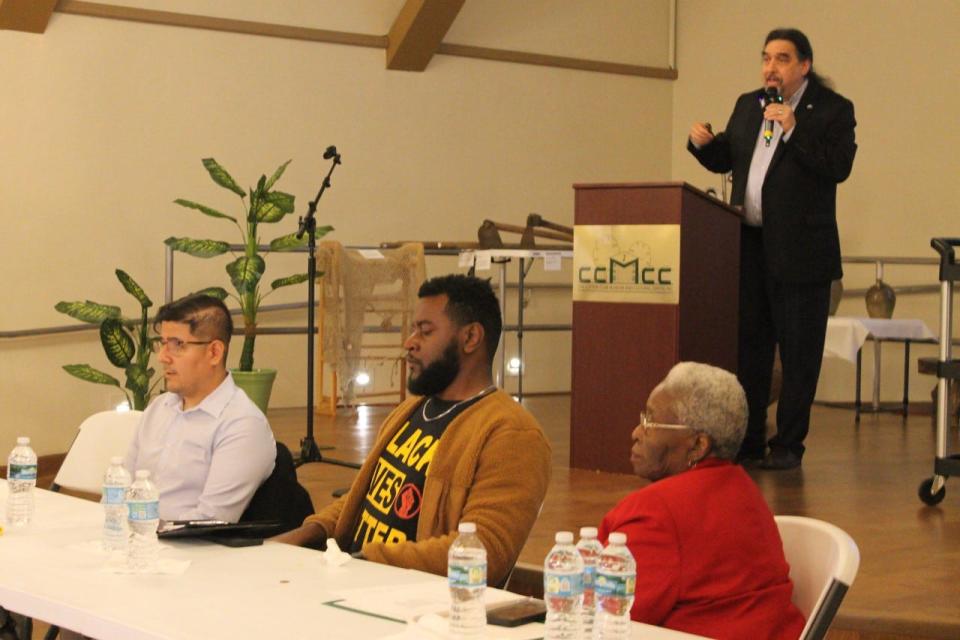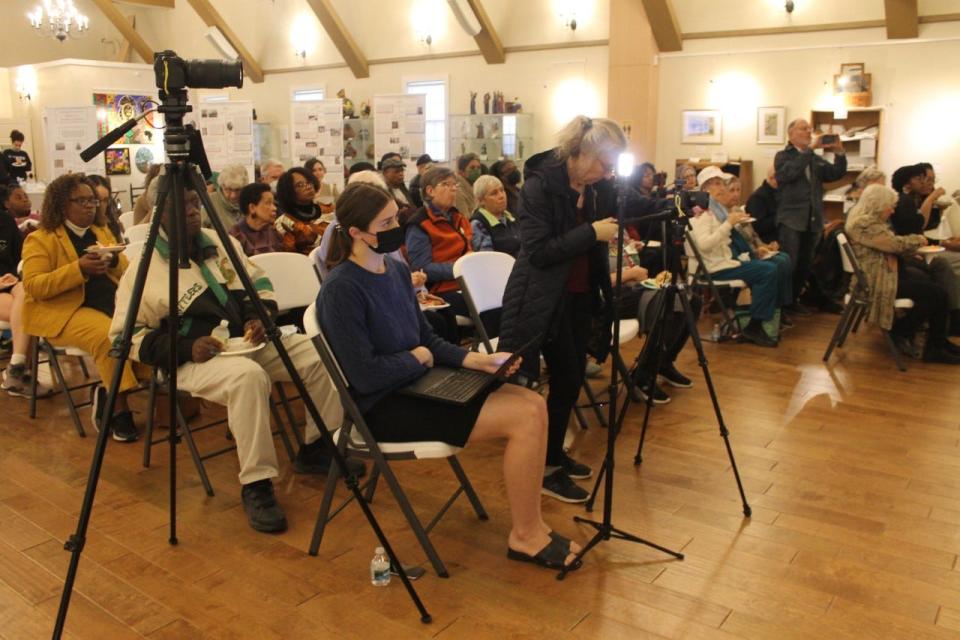Gainesville Sun's coverage of race relations from reconstruction to Jim Crow era scrutinized
How the Gainesville Sun covered race relations from reconstruction to the civil rights movement was the topic of discussion at an event held at the Cotton Club Museum and Cultural Center (CCMCC).
The discussion held Jan. 14 featured a panel of historians and newspaper researchers discussing their findings of the coverage regarding race relations in The Gainesville Sun, which was established in the late 1800s.
Billed as "Beyond the Headlines: Exploring Race and Newspaper Coverage in the Gainesville Sun," the discussion was organized by the University of Florida Samuel Proctor Oral History Program (SPOHP) and held at the museum at 837 SE Seventh Ave. The panelists included Paul Ortiz, a UF history professor and director of the SPORP; Vivial Filer, president of the CCMCC board of directors; Adolfho Romero, assistant director of the SPOHP and Donovan Carter, a SPOHP researcher; and a UF graduate student in Latin America Studies.
It was the program’s inaugural event in the 2023 Challenging Racism public program series.
Mississippi Delta:Students discuss trip to Mississippi Delta
Lynchings:Historical marker acknowledges lynchings
Gainesville history:Gainesville 150?
Staff and students at the Gainesville Sun and the Proctor Program worked together to explore the history of the Sun’s coverage of race relations from Reconstruction to the present.
The discussion on Saturday focused on The Sun’s coverage of race relations during the Reconstruction and Jim Crow eras. Part two of Beyond the Headlines is scheduled to take place in the fall semester and will focus on the Sun’s coverage of race relations during World War II through the civil rights movement, said Ortiz.
On Saturday, Ortiz made a presentation titled The Gainesville Sun: A Newspaper in Support of White Supremacy, 1876-1939.
“The Gainesville Sun’s coverage was like any other newspaper in the South,” Ortiz said. “The newspaper was involved in maintaining white supremacy.”
Ortiz explained how the Republican Party during Reconstruction expelled two Black politicians from the party, Matthew M. Lewey and Josiah T. Walls, because their white counterparts refused to allow their names to appear alongside a Black man’s name.
Ortiz added that after the expulsion, the election of white Republicans in office drew praise from The Sun.
“Most of the articles promoted how Black people were not ready to participate in society,” Ortiz said. “To maintain the myth takes a lot of energy. Every white newspaper in the South engaged in the myth-making.”
Ortiz said Lewey was a leader of the 1884 Independent Party, 1905 Pensacola Street Car Boycott and 1919-20 Florida Voter Registration Movement. He was also the first licensed Black lawyer in Florida.
Lewey founded the Gainesville Sentinel in 1887 and changed the name to the Florida Sentinel when he moved to Pensacola in 1894. His leadership of the Black press was formative to the creation of the Associated Negro Press in 1919, Ortiz said.
Walls was a U.S. congressman who served three terms between 1871 and 1876, and was one of the first Blacks elected to Congress during Reconstruction.
According to Ortiz, the first issue of the Gainesville Sun was published in 1876, and its first owners were two brothers in their 20s, W.W. Hampton and E.M. Hampton, who came from Bainbridge, Georgia, where their father had lost his plantation as a result of the Civil War.
Ortiz said The Gainesville Sun in 1920 had an editor who was a member of the Ku Klux Klan, and the paper justified the killing of Blacks by whites for defending “their (white) wives and children” after the Election Day Massacre in Ocoee near Orlando in 1920.
“Imagine an editor writing an op-ed glorifying violence,” Ortiz said.
Ortiz also talked about how The Sun’s Sports page was silent when it came to race relations.

“Like its southern counterparts, the University of Florida forced northern teams to bench all Black players. In 1939, UF refused to play Boston College unless they bench star halfback Lou Montgomery,” read a slide in the presentation by Ortiz.
Romero said trips with the SPOHP to the Mississippi Delta and Legacy Museum in Montgomery, Alabama, which is operated by the Equal Justice Initiative, inspired him to delve deeper into the history of race relations in Alachua County.
“I wanted to know what was going on in Gainesville,” Romero said. “We connected with Doug Ray (former manager editor The Gainesville Sun). I remember uncovering microfilms that were breaking in my hand.”
The next presentation was presented by Carter, who shared archives of The Sun from 1904-1924 that included 11 articles describing lynchings and KKK activity.

“This project is meant to expose the truth, recognize it, acknowledge it and begin the reconciliation process,” Carter said. “This shows me how far the truth can take you.”
The SPOHP Challenging Racism at UF public program series highlights stories of students, community organizers, faculty and others who have made an effort to create a more just world, and is supported by an Advancing Racial Justice grant from UF, Ortiz said.
“It important to unearth the hidden truths that must be told,” said Filer, chair of the CCMCC. “I don’t like any elephants in the room because I will point them out.”
Filer commended the SPHOP team for presenting the work during Martin Luther King Jr. National Holiday weekend. She said she hoped the event would inspire the audience to continue King’s work.
“Martin Luther King Jr. is all about work,” Filer said. “He does not want us to sit and talk, he wanted us to do something.”
This article originally appeared on The Gainesville Sun: UF panel talks about Gainesville Sun’s Jim Crow era coverage

